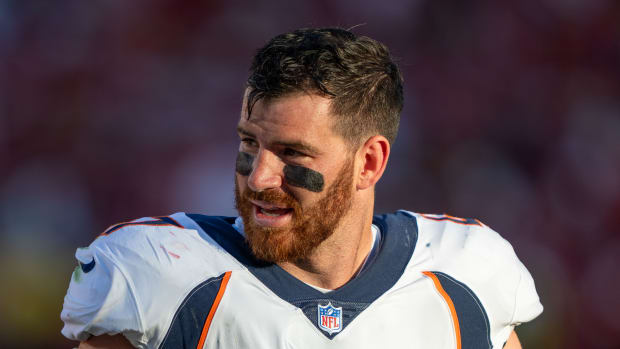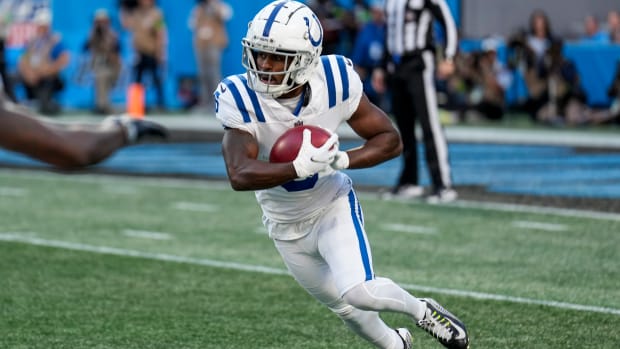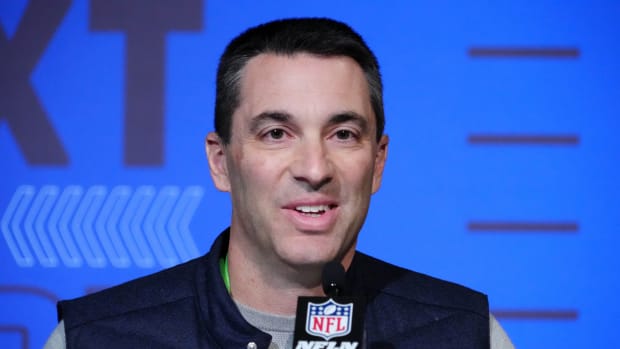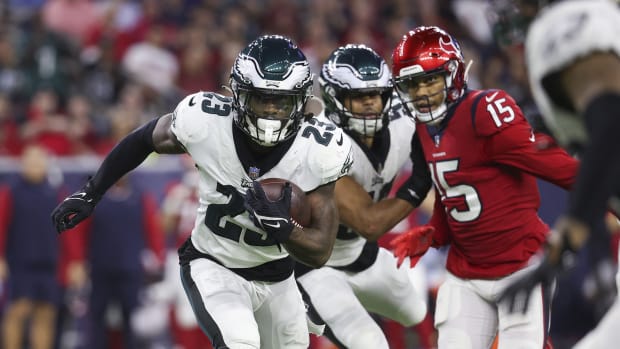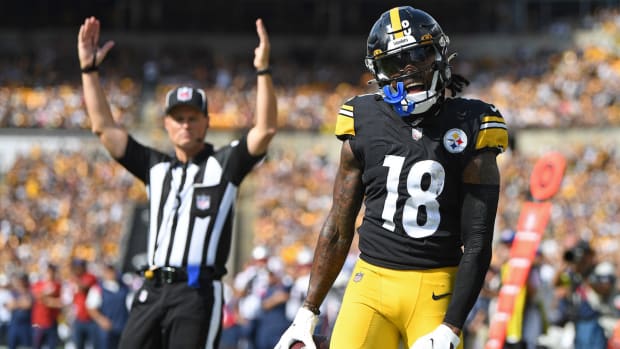'The Rams Are Our People:' How L.A.'s Team Lifted the Community After a Week of Tragedy
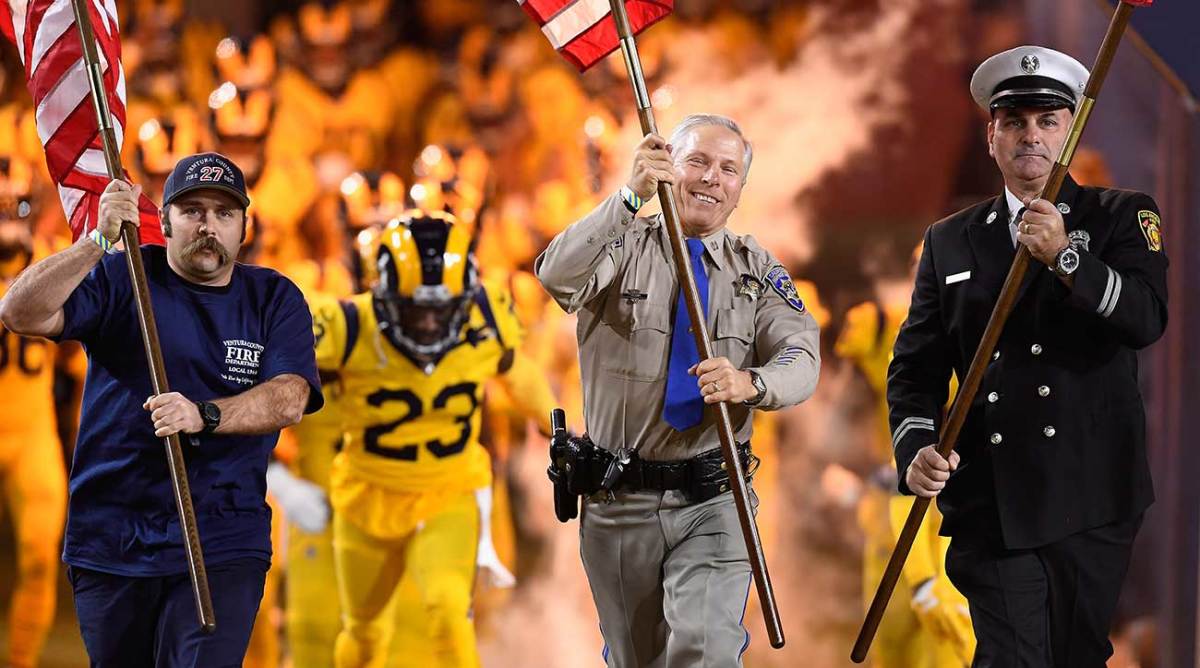
The first call came in at 11:20 p.m. on Nov. 7. Shots fired. Borderline Bar & Grill. Tim Hagel, the Chief of Police in Thousand Oaks, Calif., hopped in his squad car and sped toward the scene. He didn’t anticipate anything unusual, maybe an angry customer firing a shot off in the parking lot. But as he pulled up, he says, “The immensity became clear. It’s been described as like a war zone. Wounded people everywhere. We had 90 people injured. Some serious. Some jumping off balconies to save their lives. Broken ankles and what not. It was surreal; almost apocalyptic.”
Students from Pepperdine and Cal Lutheran frequented Borderline, a popular bar known for its live country music shows and located four miles from the Rams' temporary headquarters. Brian Hynes bought the place 10 years ago, hired security to take care of the riff-raff, cleaned the bar up, built out the crowds. He made everyone’s favorite bartender, Melissa Rackley, his general manager. She wasn’t supposed to work the bar that night, until another bartender called in sick. Had she not been behind the bar, she would been working in the front and would not have had time when the mass shooting started to gather seven customers and hide out in the attic, as gunshots exploded, interrupting the periods of silence down below. As Hynes pulled up, all he could see was smoke. “Scary,” he says.
Twelve people were killed in the shooting, including a Marine Corps veteran, a popular Sheriff Sergeant and a recent Cal Lutheran graduate who had sung in the school’s renowned choir and worked the front door at the bar. The police spent all night tending to the injured, setting up a triage area and a victims’ center where families could find out about their loved ones.
By 12:30 a.m., FBI agents from the surrounding areas started showing up, unprompted. “We can deliver a lot of resources,” one told Hagel. “All you have to do is say yes.” He did, without hesitation. By sunrise, there were 75 agents on the scene. Their day was just beginning. In the 35 years he has devoted to law enforcement, Hagel has lost track of the homicides and wildfires he was called to; he has dealt with a plane crash where everyone on board died, earthquakes and train derailments. He’d never seen anything like this, from the parking lot, as the sun crept over the clouds after the mass shooting. “You could literally see the flames and smoke rising in the east,” Hagel says. “It was apocalyptic.” There was no time to mourn. Two fires were headed their way, and the same officers who had dealt with the mass shooting climbed back in their cars, many with blood on their uniforms, and drove straight toward the blaze.
The Rams moved into their temporary digs in Thousand Oaks when they moved from St. Louis back to Los Angeles in 2016. They found a small but tight community, very unlike the Hollywood stereotypes, and the franchise immediately tried to ingratiate with the locals. Hynes, for one, hoped the team would boost local commerce. Plus, he loved Eric Dickerson and those glasses he wore while starring for the Rams. “When the shooting happened, you’d assume most people would want to run away from that,” he says. “Not deal with the negativity. The Rams stepped up.”
At the home of left tackle Andrew Whitworth, his wife, Melissa, watched the morning news shows relay details on the shooting. She immediately started crying. She had loved Thousand Oaks ever since they moved there and now she identified as a local. Her husband even coached a youth baseball team. Melissa had met Andrew when he still played for the Bengals, this mountain of man who had the softest heart. For years now, she had told friends the next season would be his last season, and yet here he was, at 37, in his second season with the Rams. On the flight to L.A. after signing in the spring of 2017, he had turned to his wife, knowing the Rams were young and probably years from contending, and said, “My dreams of winning a Super Bowl are over. I’m going to L.A. to rebuild that locker room and provide a veteran presence.” Melissa said nothing, thinking to herself, “That’s really sad.” But as general manager Les Snead retooled the roster the past two offseasons, she started to wonder. “They’re wanting to win now,” she says.
That same afternoon, on Nov. 8, she picked up her children from school and continued to watch the news. The same stations played at the Rams facility, where the team started practice around noon, as smoke plumes billowed in the distance. Bruce Warwick, the Rams operations director, watched as planes dropped fire retardant on nearby hills. “Like, holy s---,” he says. The Hill Fire started moving toward them from the east; then the Woolsey Fire from the north. Combined the fires burned more than 100,000 acres.
Like their police counterparts, local firefighters went straight from the shooting toward the blazes. “For a while, it actually made us not think about it,” says Capt. Brian McGrath, of the Ventura County Fire Department. “But over time something that dramatic just eats at you. It takes a toll on your life.” Some of his people worked 36 hours straight; a few as many as 72. Grocery stores handed them free food. A taco truck made deliveries, gratis. The department received so many donations that they set up a temporary shelter and that space filled up within days.

A memorial to the victims of the Borderline Bar and Grill shooting in Thousand Oaks.
Photo by Hans Gutknecht/Digital First Media/Los Angeles Daily News via Getty Images
Whitworth addressed the team as it gathered that afternoon. He told his teammates that their community needed them, that they needed to be out front and vocal and help in any way they could. To set that example, he donated his next game check to the victims of the shooting, handing over $60,000. On the news his wife saw the fires spreading between the team’s facility and their home. She sent her husband a text message, asking if he could even get back. He did.
As darkness descended on Nov. 8, the fires only picked up the pace, boosted by 55 mph winds. Rams staffers stayed at the team’s business office, in Agoura Hills, trying to book hundreds of hotel rooms for players and their families, finding spots everywhere from Santa Barbara to Burbank. By 2 a.m., their office had to be evacuated. The fires continued straight toward the practice facility. “Oh, my God,” Warwick thought to himself. “All our stuff is going to catch fire and we’re not going to be able to play the Seahawks.”
The Whitworths were evacuated at 2 a.m. Melissa took her four children, her dogs (a pug and golden retriever), her wedding ring and her grandmother’s cookbook. They had wanted to let their youngest, their 4-year-old daughter, sleep as long as possible, only to realize that in their rush they had almost forgotten her in her bed. Andrew ran back and carried her outside. The smoke outside was thick, Melissa says, and she will never forget the acrid smell.
In the neighborhood of 90 Rams players, coaches and staffers were evacuated from their homes. That list included quarterback Jared Goff, defensive coordinator Wade Phillips, defensive lineman Aaron Donald and general manager Les Snead, who lives in Malibu and thought he was going to lose his house. He even texted someone the address and asked him to check on his abode. “Your house burned down,” the person told him, only for Snead to later realize he had sent over the wrong address. His house sustained some smoke damage but remained intact. “Yeah, my house may burn down,” he told Ray Farmer, a former NFL executive and close friend. “But whatever, we’ll be fine. I have my favorite sweatshirt with me. My bike is here at the facility. I’m more concerned about my team.”
Already, the outpouring had started. Vanessa Bechtel, the president of the Ventura County Community Foundation, was able to use Whitworth’s check and other donations to distribute $70,000 in prepaid credit cards to those who had lost their wallets, keys and possessions as they fled their homes. Over 25,000 people from all over the world—from Korea and New Zealand and every single state—contributed in the first month alone. They also distributed $20,000 to each of the victims' families in the mass shooting for funeral and travel costs. By 2 p.m. on Nov. 8, even Bechtel’s office had been evacuated.
As Friday’s practice approached, McVay decided that with all his players spread across various hotels in Southern California, he had to cancel their workout that afternoon. He told them to tend to their families and the team set up at a hotel near USC, with ownership covering all additional expenses.
McGrath, the fire captain, says roughly 4,000 firefighters responded to the blaze. A full 200 had been dispatched immediately. It took until the day before Thanksgiving to contain the fires, and officials estimate at least 30 people died.
• BREER: How the Rams Dealt With Tragedy and Displacement
Megan Glynn, the chief development officer for the Southeast Ventura County YMCA, grew up a Rams fan and raised her four boys to love football, even after the team departed for St. Louis. When the franchise moved back, the family purchased a bunch of Rams gear. The boys loved Goff and Gurley and sometimes they would just shout out “Cooper Kupp,” the Rams fan-friendly wideout. They liked the sound of his name.
While Glynn collected donations for the Y, she had to evacuate her own home, with her husband, a fighter pilot for the International Guard, out of town. She could see smoke coming down the hill, toward her home. She grabbed a suitcase, important documents and her husband’s pilot wings; one of her boys lugged his model airplanes; another took only his favorite pair of underwear.
By December, after partnering with the non-profit California Strong that had emerged in the wake of the fires and was backed by famous athletes, like Goff, the Y had already raised over $100,000. They distributed some of that in December and the rest in January, up to $150,000. One man told her he didn’t deserve the money, because he didn’t have a family. One woman was so stressed she had a heart attack.
The Rams impressed Glynn with their level of immediate engagement. They wrote a $100,000 check. Players supported the cause with signage on their cleats, or wore California Strong hats and T-shirts after games. Punter Johnny Hekker visited the first responders. Rams legends Jackie Slater and Dickerson manned telephones with cheerleaders.
Whitworth, a four-time Pro Bowler who never won a playoff game in 11 seasons with the Bengals, provided the most inspiration. His wife says that for weeks she burst into tears, unsure of exactly why. She didn’t want the shooting victims to be forgotten in the aftermath of the fire damage. Funeral homes were closed, evacuated.
Inside Goff’s hotel room at the W hotel near UCLA, he watched the news with his sister, Lauren. The Rams were scheduled to play the Seahawks in 48 hours. Neither wanted to think too much about the fires that their father, Jerry, had confronted in his second career after he retired from pro baseball, as a firefighter in Northern California. The worst incident they can recall was a gas explosion in San Bruno. Jerry was in the first engine that arrived to fight it, while his family watched back home.
Goff knew he wanted to be involved. The connection, for him, was personal. He had even been evacuated. Lauren recalls how somber it felt at the stadium in the aftermath of such a devastating week. The Rams won, 36-31, but their operations director, Warwick, had found during the game that they would likely not be able to go to Mexico City for their contest the next week on Monday night against the Chiefs. With the fires still raging, after the shooting, the evacuation and the scramble to find rooms, the Rams were headed to Colorado Springs, Colo., to prepare in high altitude for their international contest with Kansas City. Team officials met with the NFL on Monday. By Tuesday, they had decided to move the Chiefs game to Los Angeles—or, basically, to staff and host a game in five days, while the community around them started to grieve.
• Rams Dedicate Monday Night Game vs. Chiefs to Los Angeles
Owner Stan Kroenke chartered a second plane to take the players’ families with the team to Colorado. He paid for all the hotel rooms, all the meals. The Rams practiced at the U.S. Air Force Academy. As the team prepared to return home on Saturday, 48 hours before they were set to host the Chiefs, they got stuck in an ice storm. McVay canceled the walk-through practice. The bus the team was riding in careened off the road. Their plane slid off the runway. No one was hurt, but the blows, it seemed, would never end.
Meanwhile, back at the police station, Hagel says thousands of sympathetic cards started to pour in. He assigned two officers to sort through them for two full weeks and assigned one officer to each of the victim’s families. They received the letters in batches, usually over tears.
The Rams and Chiefs both entered their game in Los Angeles at 9-1. The Rams gave away thousands of tickets to first responders, local residents displaced from their homes and victim’s families from the shooting. The team provided e-tickets rather than paper ones and handled parking on a first-come, first-serve cash basis. Their business office had sustained extensive damage from the smoke, but they would put the game on. They had to.
No one in attendance that night will ever forget what happened. The relatives of victims and the first responders stood together, on the field, gripping the American flag as it unfurled. The choir from Cal Lutheran, which had lost their recent graduate in the shooting, sang the national anthem as tears rolled down so many faces. Their director, Dr. Wyant Morton, had wondered just how the Rams would fit into their sleepy campus of 4,000 students. Now he knew. They had honored his student, Justin Meek, a criminal justice major adored by everyone he came across. “Just surreal,” Morton says.
The game went back and forth. The teams combined for 1,001 yards and 105 points. The Whitworths donated their luxury suite to first responders. “I just kept thinking, there’s no way we don’t win this; the universe has got to let us in,” Melissa says. L.A. did prevail, 54-51. As Hynes, the bar owner, watched the families of the victims walk onto the field, emotion overwhelmed him. He found Whitworth on the field. “I couldn’t pay my employees anymore,” he told him. “But with that check, I can.” As he recalls the story, his voice breaks.

Members of the California Lutheran University choir sing the national anthem before Rams-Chiefs.
Photo by Kevork Djansezian/Getty Images
So what happened in the months that followed?
After 12 seasons without a postseason victory, Whitworth finally won a playoff game, against Dallas on Jan. 12. The Rams nominated him for the league’s Man of the Year award; he’s the strongest nominee in franchise history. The next week, Los Angeles topped New Orleans in a thriller to advance to Super Bowl LIII. To Melissa Whitworth it all felt a little fateful (and the bogus non-pass-interference call didn’t hurt).
Rackley, the bartender who saved seven lives by hiding in that attic, went to therapy. So did the cops, firemen, 9-1-1 dispatchers and first responders. The Chargers gave Rackley tickets to the Super Bowl, not caring that she will now root for the Rams.
California Strong, with Goff in a central role, raised $1.5 million. Next Friday, they will distribute two-thirds of that total. All the events “have brought us together,” says Warwick, his comments echoed by several players.
“Let me close my office door,” Hagel says as he answers a phone call to discuss the fires. “It can be hard to hear all this for my officers and staff.” As the police chief, Hagel will be dealing with the aftermath of that terrible week in November for years. He will be buoyed by the community’s response, led by everyone’s new favorite football team. “I’m looking out at my floor now,” he says on Friday, 48 hours before the Super Bowl. “All our officers are wearing Rams jerseys. They have to take them off if they get an emergency call. I’m staring at gun-toting cops in Rams jerseys, because these are Rams families, and the Rams are our people.” He pauses, trying to contain his emotions. “They are rooting for L.A. like you can’t even imagine.”

































